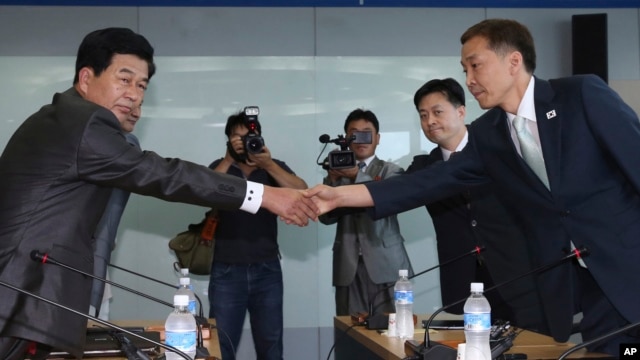
Kim Kiwoong, head of South Korea's delegation, shakes hands with his North Korean counterpart Park Chol Su before their meeting
SEOUL — North and South Korea have reopened their joint factory zone in Kaesong, just north of their shared border. The restart is seen as the most substantial sign of warming relations between the two sides following tensions earlier this year over Pyongyang’s missile and nuclear tests.
Lines of trucks and cars crossed South Korea's northern border checkpoint Monday morning on the way to Kaesong, North Korea.
About 800 South Korean managers and their staff entered the suspended, jointly run factory zone at Kaesong with materials and parts to restart production for the first time in months.
South Korean managers crossing the border Monday expressed joy and relief to be getting back to work.
Ji Yoon-tae, deputy chief of a South Korean company at Kaesong, says it has been very tough while the complex was shut down. He says he is sure his company has been having a hard time but, personally, it was really tough. From now on, he says, I hope everything works out well, that the complex becomes revitalized again, and everyone works for a vibrant Kaesong Industrial Complex.
Since its start in 2004, the Kaesong Industrial Complex was a resilient symbol of North-South cooperation, surviving numerous periods of military and political threats.
But Pyongyang in April pulled its contribution to the joint venture, some 53,000 factory workers, amid military tensions with Seoul and Washington.
After months of negotiating, the two Koreas last week reached a deal to reopen the industrial complex with a joint committee to resolve future problems.
South Korean companies say they lost about $1 billion from the suspension of factories producing textiles, watches, and parts for electronics.
As compensation, the North and South Korea agreed the factory owners would be exempt this year from paying taxes.
Officials from the two sides have been holding weekly meetings to discuss further details, including legal protections for South Korean workers and whether the North Koreans who walked should receive compensation.
The two sides also agreed to invite foreign investment from October, a key demand of Seoul to add international pressure on Pyongyang to discourage future shutdowns.
South Korea's Deputy Minister of Trade, Industry and Energy Choi Kyong-lim told the Seoul Foreign Correspondents' Club they hope many Chinese companies, in particular, will invest in Kaesong.
He says the importance of Chinese companies in Kaesong Industrial Complex is easily understood even if he does not explain. The location of Kaesong Industrial Complex is close to China. Also, he says, the regular wage in China is higher than the level of countries in Southeast Asia and continues to increase. He says it is important for Chinese companies to utilize North Korean labor at the Kaesong Industrial Complex where wages are low but productivity is high.
China is North Korea's closest ally and believed to have the most, though limited, influence over Pyongyang.
Choi (chweh) says South Korean and Chinese officials discussed the legal aspects of products made at Kaesong during recent free trade negotiations.
But it is not clear how much interest Chinese, or any other foreign companies, would have in investing at the factory complex.
The risk of political problems is still high, say political analysts, despite much improved inter-Korean relations.
Cho Bong-hyun (choe bohng HYUN), with the Economic Research Center of the Industrial Bank of Korea, says Kaesong at least offers better guarantees than other North Korea investments.
He says some foreign companies have invested and produced in cities in North Korea including Pyongyang. The investment in other cities, he says, has more risks than the Kaesong Industrial Complex. The Kaesong Industrial Complex has been created under the regulation of the Kaesong Industrial Zone, he says, and it is being operated under the agreement between the two Koreas.
So the complex has less risk for investment than others. In addition, he says, Kaesong has better infrastructure for production than other regions so foreign companies (would) prefer it to other cities.
Also Monday, the Korean Red Cross announced the names of 100 North Koreans and 96 South Koreans chosen for next week’s reunions of families divided by the Korean War.
Since 2000, the two Koreas have had 18 such limited reunions of families separated since the three-year conflict that began in 1950.
The popular exchange was halted in 2010 when Seoul blamed Pyongyang for the sinking of a South Korean navy ship that killed 46 sailors. But, as part of warming relations, the two sides agreed in August to resume the meetings.
About 22,000 Koreans were reunited with their relatives through the program since it started in 1985.
|
|
